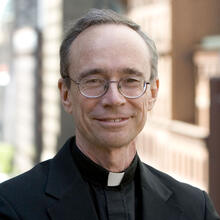(RNS) — The Scripture readings during Advent are a mix of comfort and challenge.
On the one hand, the readings from Deutero-Isaiah (Isaiah 40-56) offer us comfort. The author was speaking to Jewish exiles in Babylon who longed to return home to Jerusalem. Deutero-Isaiah tells them God is with them and will guide their return.
Today, our world is full of refugees who, like the exiles in Babylon, would return home if their countries were not torn apart by war, ethnic conflicts, political instability and economic chaos. Advent promises comfort to them and to us.
But other readings want to scare us with the possibility of Jesus coming to judge our misdeeds. Be prepared! He will come like a thief in the night (2 Peter 3:10). What sort of person do we want to be when the Lord comes? Will we be ready?
What sort of person do we want to be when the Lord comes? Will we be ready?
So, which is it? Does God want to comfort us or does God want to scare us? Or is God schizophrenic?
A few years ago, a Jesuit friend of mine told me he saw a T-shirt that he really liked. The words on the T-shirt said, “Jesus is coming, look busy.” This is the message of warning in some readings during Advent.
On the other hand, Deutero-Isaiah would say, “Jesus is coming, look happy.”
I know someone who had a relative return home a few years ago after an abusive marriage. The relative is in therapy and financially dependent on the family member. Now, five years later, the family member does not know whether to hug this relative or tell the person to grow up and get on with life.
I think God faces the same confusion in dealing with us, and we face the same confusion in dealing with ourselves. Do we need comfort or do we need to be challenged? A liturgy from this week tells us we need both: “kindness and truth shall meet; justice and peace shall kiss.”
Deutero-Isaiah portrays God as a God of mercy and love, a God who wants to comfort, not punish his people.
God does not comfort us so we can simply be comfortable. God comforts us so we can comfort others.
This is what Pope Francis means when he says the church should be like a field hospital. Each of us has our own wounds, our own sins, our own disappointments, and we need to hear words of comfort from God. We need healing and comfort, and that is what Advent is about.
And yet that is not the only message of Advent. God does not comfort us so we can simply be comfortable. God comforts us so we can comfort others. We must do what we can to “Make ready the way of the Lord, clear a straight path for the Lord.”
We do that by imitating God, by imitating Jesus, by comforting his people, by binding up wounds, by healing each other’s injuries, by righting wrongs with mercy and justice.
Our world needs to be comforted. Our world needs to be challenged to bring comfort to those in need. This is especially true of refugees and those suffering from war in the Holy Land and in so many other places in the world.
Advent is a time when we prepare for the coming of the Lord. We hope for his comfort, but we also try to get our act together by accepting his challenge to live lives of kindness and truth, of justice and peace.
The coming of Christ tells us our God is loving and merciful, but also challenging. He comforts but also gives us a mission: “Comfort, give comfort to my people,” says the Lord, as written in Isaiah. Or as John the Baptist said, according to the Book of Mark, “Prepare the way of the Lord, make straight his paths.”








